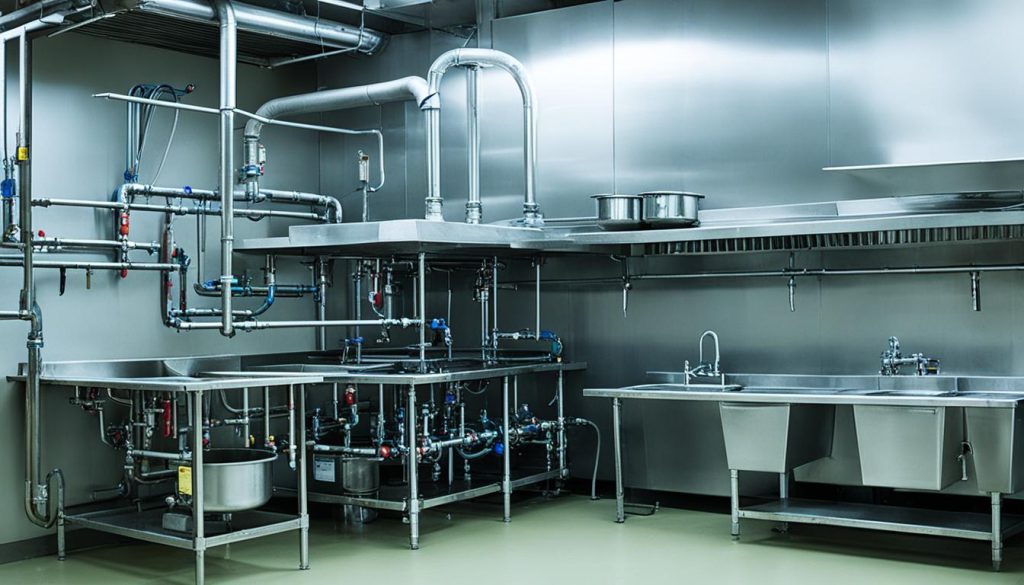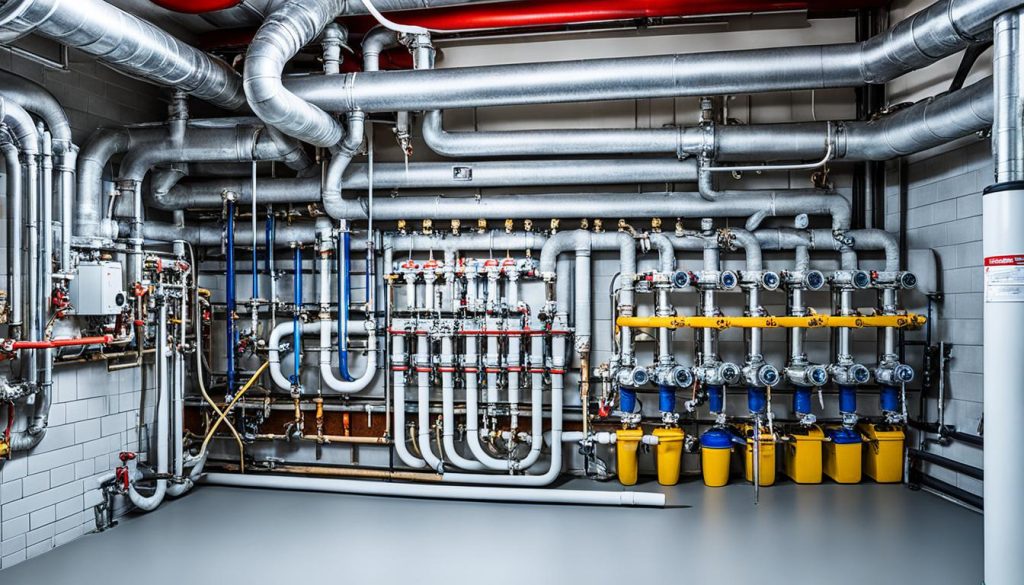Understanding Commercial Lease Plumbing Responsibility
Did you know that in a commercial lease, the responsibility for plumbing maintenance and repairs can vary depending on the type of lease and the negotiation between the landlord and tenant? It’s essential for both parties to clearly define and allocate these responsibilities in the lease agreement to avoid any misunderstandings.
Key Takeaways:
- The responsibility for plumbing maintenance and repairs in a commercial lease can vary depending on the type of lease and negotiation between landlord and tenant.
- Landlords are generally responsible for keeping common areas in good repair and repairing and replacing plumbing systems.
- Tenants are usually responsible for ordinary and routine maintenance and repairs within the leased premises.
- The specific plumbing responsibilities of both parties should be clearly defined in the lease agreement to avoid disputes.
- Seeking legal guidance can be beneficial when dealing with the complexities of commercial lease agreements.
Types of Commercial Leases
In a commercial lease agreement, the allocation of responsibilities between landlords and tenants can vary depending on the type of lease. Understanding these different types of leases will help clarify the plumbing responsibilities and maintenance obligations.
Gross Leases
A gross lease is a type of commercial lease where the landlord includes all expenses associated with the premises, including plumbing maintenance, in the rental payment. This means that the landlord takes responsibility for the water system and plumbing maintenance, relieving the tenant of any direct obligations.
Net Leases
In contrast to gross leases, net leases require the tenant to pay the landlord for their share of expenses, such as real estate taxes, insurance, and operating expenses. Depending on the specific terms negotiated, the tenant may be responsible for plumbing maintenance and repairs. It is crucial to review the lease agreement to determine the tenant’s plumbing responsibilities under a net lease.
Percentage Leases
Percentage leases are commonly used in retail spaces, where the tenant pays a base rent plus a percentage of their gross sales. In this type of lease, the allocation of plumbing responsibilities can be negotiated. The lease agreement should clearly outline the tenant’s responsibility for plumbing maintenance and repairs.
Regardless of the type of lease, it is essential for both parties to clearly define and allocate the responsibilities for plumbing maintenance and repairs in the lease agreement. This ensures that both the landlord and tenant understand their obligations and helps prevent any disputes in the future.
Landlord’s Plumbing Responsibilities
In a commercial lease, the landlord bears certain responsibilities regarding plumbing maintenance to ensure that the premises are in good condition for the tenant. These responsibilities include:
- Repairing and replacing plumbing systems, such as pipes and fixtures, that are provided with the leased premises.
- Keeping the common areas, including shared bathrooms and utility rooms, in good repair.
- Addressing and resolving plumbing issues or problems with the water system in the leased premises.
It is important to note that the specific plumbing responsibilities of the landlord can vary depending on the terms outlined in the lease agreement. To understand and be aware of the landlord’s obligations concerning plumbing maintenance, tenants should thoroughly read and comprehend the lease agreement. This enables tenants to hold the landlord accountable and ensure that necessary repairs and maintenance are promptly carried out.
For a comprehensive overview of the landlord’s plumbing responsibilities, refer to the table below:
| Landlord’s Plumbing Responsibilities | Details |
|---|---|
| Repair and replacement of plumbing systems | Landlords are responsible for maintaining and repairing plumbing systems, including pipes and fixtures, provided with the leased premises. |
| Maintenance of common areas | Landlords are responsible for keeping shared bathrooms and utility rooms in good repair. |
| Resolving plumbing issues | It is the landlord’s responsibility to address and resolve any plumbing issues or problems with the water system in the leased premises. |
Tenant’s Plumbing Responsibilities
In a commercial lease, tenants bear certain responsibilities when it comes to plumbing maintenance. These responsibilities can include routine maintenance and repairs for plumbing systems and fixtures within the leased premises. As tenants, it is our duty to promptly report any plumbing issues or problems to the landlord and actively cooperate in resolving them.
Under the terms of the lease agreement, tenants are typically accountable for any damage or issues caused by their actions or inaction. This includes taking responsibility for repairs resulting from tenant negligence or misuse of plumbing equipment.
By maintaining open lines of communication with the landlord and promptly reporting any plumbing issues, tenants can ensure that repairs are addressed in a timely manner, minimizing both inconvenience and potential damage.
Tenant’s Plumbing Responsibilities in Summary:
- Perform ordinary and routine maintenance for plumbing systems and fixtures within the leased premises.
- Promptly report plumbing issues or problems to the landlord.
- Cooperate with the landlord in resolving plumbing maintenance and repair matters.
- Take responsibility for damages caused by tenant actions or inaction.
Tenant’s Plumbing Responsibilities Table:
| Responsibilities | Explanation |
|---|---|
| Performing maintenance | Conduct ordinary and routine maintenance for plumbing systems and fixtures within the leased premises. |
| Reporting issues | Promptly report any plumbing issues or problems to the landlord for immediate attention. |
| Cooperating with landlord | Actively cooperate with the landlord to resolve plumbing maintenance and repair matters efficiently. |
| Taking responsibility | Assume responsibility for damages caused by tenant actions or failure to fulfill maintenance obligations. |
Apportioning Maintenance and Repair Responsibilities
When it comes to commercial leases, the allocation of maintenance and repair responsibilities can vary depending on various factors. The negotiation power of the landlord and tenant, the type of lease, and the design of the premises all play a role in determining who is responsible for plumbing maintenance.
Generally, landlords are responsible for structural repairs and major component parts of the premises, such as the roof and foundation. The tenant, on the other hand, is responsible for maintenance and ordinary repairs to items inside the premises that they have control over.
However, it is not uncommon for landlords to attempt to shift some repair and replacement responsibilities to the tenant, especially for items that exclusively serve the leased premises, such as HVAC systems. It is crucial for both parties to clearly define and apportion these responsibilities in the lease agreement to avoid any confusion or disputes in the future.
By clearly outlining the specific plumbing responsibilities in the lease agreement, both landlords and tenants can ensure that their obligations are well-defined and understood. This can help prevent misunderstandings and potential disagreements down the line, ultimately fostering a healthier landlord-tenant relationship.
While it is common for landlords to handle major plumbing repairs and maintenance, it is important to consider the specific needs and requirements of the leased premises. Some lease agreements may require the tenant to take on additional responsibilities, particularly if they have exclusive control over certain plumbing systems or fixtures.
Open and transparent communication between landlords and tenants is key to establishing fair and reasonable maintenance and repair responsibilities. It is advisable for both parties to thoroughly review the lease agreement and seek legal guidance if needed to ensure that the allocation of plumbing responsibilities aligns with their expectations.
Factors Affecting Responsibility Allocation
The allocation of plumbing maintenance and repair responsibilities in a commercial lease can be influenced by various factors. One of the key factors is the length of the lease term. In longer-term leases, landlords may be more inclined to shift additional responsibilities to the tenant, while in shorter-term leases, the landlord might retain more control and responsibility.
Additionally, the number of tenants in a particular building can also impact the allocation of responsibilities. Buildings with fewer tenants may have a higher likelihood of tenants taking on additional maintenance and repair duties.
It is essential for both landlords and tenants to carefully consider these factors and communicate their expectations and requirements during lease negotiations to ensure a clear understanding of plumbing responsibility allocation.
| Factors | Effect on Responsibility Allocation |
|---|---|
| Lease Term | In longer-term leases, landlords may shift additional responsibilities to the tenant. |
| Number of Tenants | Buildings with fewer tenants may have tenants taking on additional maintenance and repair duties. |
Importance of Clear Apportionment of Responsibilities
Clearly defining and apportioning plumbing maintenance and repair responsibilities is crucial in a commercial lease. Ambiguous or unclear language in the lease agreement can lead to disputes and conflicts between the landlord and tenant. It is important for both parties to carefully review the lease agreement and draft clear and specific provisions regarding plumbing responsibilities. The terms should clearly outline the obligations of both the landlord and tenant and provide clarity on who is responsible for what aspects of plumbing maintenance. This can help prevent misunderstandings and ensure that both parties fulfill their obligations as outlined in the agreement.
| Benefits of Clear Apportionment of Responsibilities: |
|---|
| 1. Avoid Disputes: Clear provisions in the lease agreement help to prevent disagreements and conflicts between the landlord and tenant regarding plumbing responsibilities. |
| 2. Accountability: A well-defined allocation of responsibilities ensures that both parties understand their obligations and can be held accountable for fulfilling them. |
| 3. Efficient Repairs: With clear responsibilities in place, necessary plumbing maintenance and repairs can be addressed promptly, minimizing potential disruptions to business operations. |
| 4. Cost Savings: By clearly delineating who is responsible for plumbing maintenance and repairs, both the landlord and tenant can effectively manage their budget and avoid unexpected expenses. |
By establishing clear apportionment of plumbing responsibilities in the lease agreement, landlords and tenants can foster a cooperative and productive relationship, promoting a well-maintained and functional plumbing system throughout the commercial property.
Seeking Legal Guidance
When dealing with the intricacies of commercial lease agreements and plumbing responsibilities, seeking legal guidance can be beneficial. Hiring a lawyer with experience in commercial leasing can help you navigate the complexities and ensure that your rights and interests are protected. A lawyer can review the lease agreement, provide advice on the allocation of plumbing responsibilities, and help negotiate favorable terms. They can also assist in resolving any disputes that may arise regarding plumbing maintenance and repairs during the lease term. The expertise and guidance of a lawyer can provide valuable support in understanding and upholding your rights and responsibilities in a commercial lease.
Seeking Legal Guidance
When it comes to navigating the complexities of commercial lease agreements and plumbing responsibilities, seeking legal guidance can be highly beneficial. Hiring a lawyer with experience in commercial leasing can provide the expertise and support needed to protect your rights and interests.
A skilled lawyer can thoroughly review the lease agreement and provide valuable advice on the allocation of plumbing responsibilities. They can ensure that the terms are favorable and help negotiate any necessary changes to protect your rights as a landlord or tenant.
In the event that disputes arise regarding plumbing maintenance and repairs during the lease term, a lawyer can step in to help resolve the issues swiftly and effectively. Their experience and guidance can make all the difference in understanding and upholding your rights and responsibilities in a commercial lease.
- Investing Wisely: How Windows & Doors in Boost Property Value and Financial Health - April 24, 2025
- The Financial Impact of Personal Injuries: Why Legal Help Matters for Business Owners - April 16, 2025
- The Hidden Financial Costs of Domestic Assault: What Business Owners Need to Know - April 16, 2025













